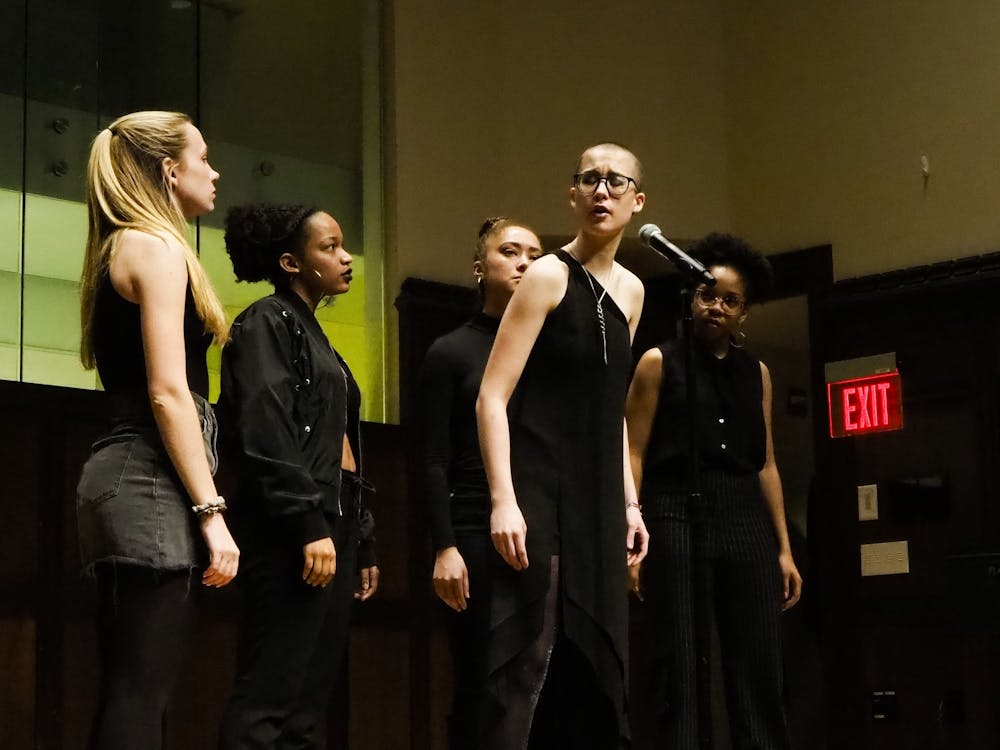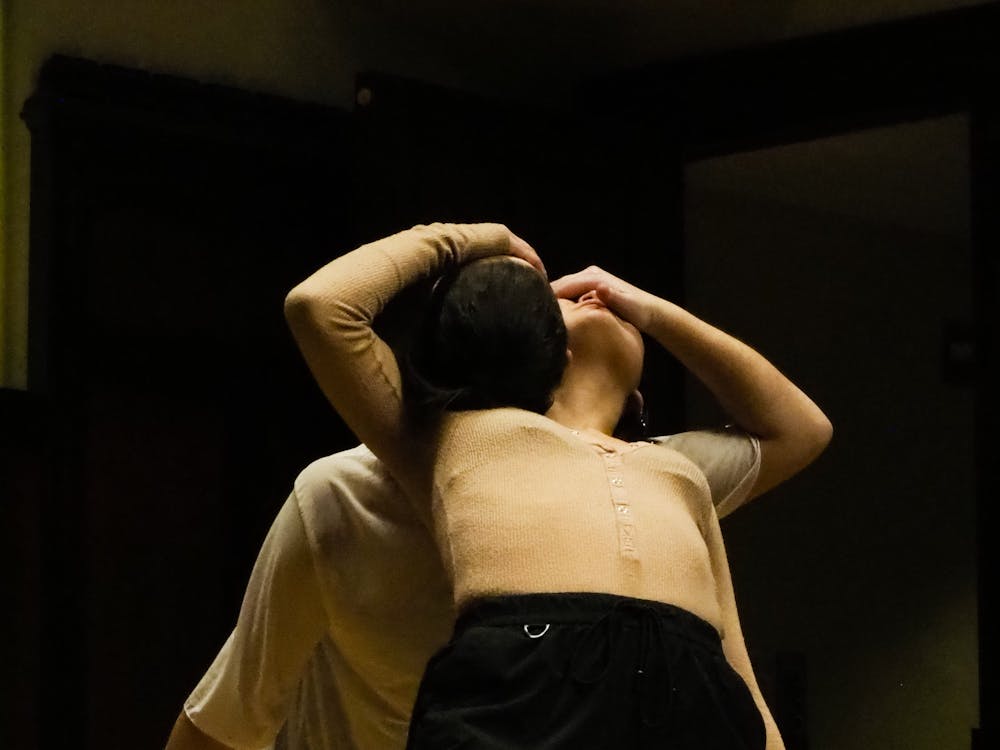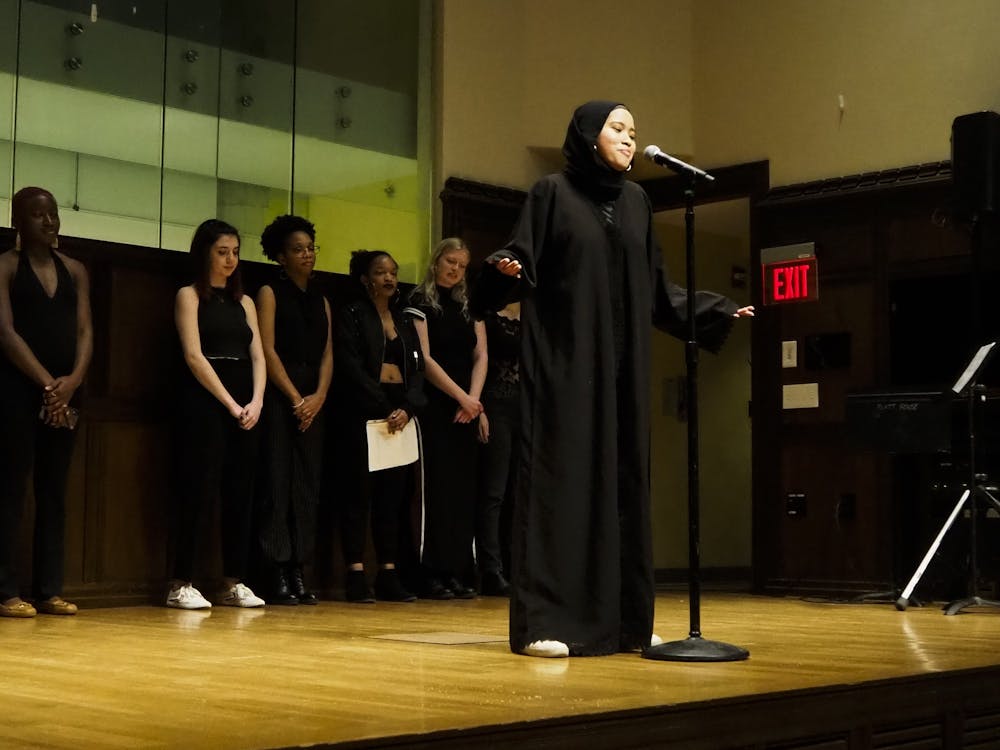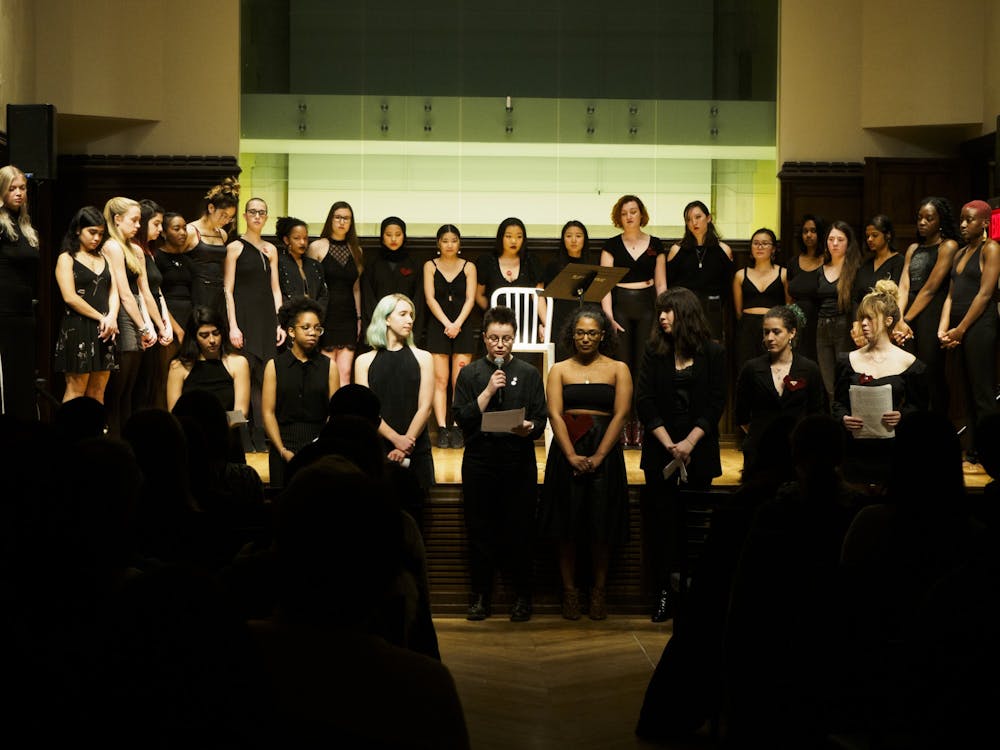CONTENT WARNING: Mentions of sexual violence and overcoming trauma.
At the end of Penn V-Day’s first ever Penn Monologues, performers and cast, wearing all black, entered the stage to form a semi–circle. Standing together, they held hands and hug. This was a space and moment meant for them.
Penn Monologues marks a new beginning. Penn V–Day has performed the Vagina Monologues, a series of pieces written by Eve Leiser, a white cis woman, for twenty years. The proceeds from this show and other events go to WOAR, Philadelphia’s only full–service rape crisis center. This past weekend, Penn V–Day debuted a new show built on pieces submitted by the community, including those by undergraduate and graduate students, alumni, and even WOAR counselors.
Beyond a production, this space focused on survivors and understanding the emotional journeys that individuals face when dealing with their experiences. Serena Martinez (C ‘22), who wrote and choreographed for Penn Monologues, says, “First and foremost the performance of the pieces were for the survivors and the cast.”
Mckayla Warwick (C ‘20), director of this inaugural performance, emphasized focusing on survivors, the cast, and those who chose to write for the performances.
“We wanted the space to center survivors, and often V–Day does have an element of that but I would say that we really did have that [this year], because people were so closely connected to the work that we performed,” she says. “Many people within the cast have told me that having this outlet was a space to be seen and a space to be heard—yes by audiences, but also by each other, creating a network of people who do understand.”
“It is very telling and compelling and strong that when we open the submissions and didn't indicate a theme that the majority of the submissions we received pertained to sexual violence,” Mckayla says. “There needed to be a space for people to vocalize this and share those words. That is what this space is going to be.”
Briar Essex (C ‘20) acted as workshop chair, a new position created for Penn Monologues. Briar worked with writers to translate pieces into performances, saying that giving writers agency was especially important because “a lot of folks are talking about moments when they didn't have ownership or agency." That, they say, was taken from them.

They also tried to respect the work done by anonymous writers by giving them input around who would perform the pieces. They say, “You don't need to tell us who you are in order to share it. We want to hear your voice no matter what.”
Rosie Nguyen (W ‘20) submitted and performed 69, which details her own experiences with assault, the importance of consent, and finding the ultimate truth within different perspectives.
“I’ve only told people very close to me before, but I’m at a place where I know these stories need to be heard, because these things happen,” Nguyen says. “It’s hard to talk about it, but it’s important too.”
Nguyen also mentions her reflections on Brett Kavanaugh’s Supreme Court confirmation, noting that Dr. Christine Blasey Ford “experience[d] this horrendous thing so long ago when she had no support and no help, [and] her story got left behind,” Rosie says. “It's different for me and all the people who are involved with Penn Monologues today in that we get to tell our stories now.”
“I can say that my story was not left behind,” Rosie adds.
Through performing with Penn Monologues, Rosie, along with many of her castmates, found support and empowerment.
“It's a very sensitive piece but when I was telling it, I didn't feel afraid. I felt confident [in] sharing something so personal,” Rosie says. “Knowing that everyone who is there, both people in the cast and the audience, are people who support me and stand behind me, gave me a lot of courage and power.”
Penn Monologues also provided spaces for people uncertain about sharing their stories. Anne Lally (C ‘21) wrote a piece anonymously and performed in My Sexuality is Fear and Tinder Love Poetry.
Anne says, “I'm not a writer, I'm very pre–med, I've never taken an English course at Penn. I never thought of myself as eloquent. I was like, ‘Is my piece worth being here when there are so many people who have submitted who have such powerful voices?’”
Anne noted that Mckayla was extremely supportive of her feelings, and ensured Anne felt comfortable throughout the process. Ultimately, Anne decided to keep the piece in the show.
“The first time I heard it in the show, it really hit differently,” she says. “The second time I heard it, the third time I heard it, I felt more empowered after every time.”
Additionally, the show purposely included voices previously excluded by the traditional Vagina Monologues, offering a space to community members who had felt left out. Briar, the director of the final Vagina Monologues, knew the show felt exclusionary to some.
“Nothing about this is about me. Last year that was sort of a two–handed thing in that nothing in the show was about me in a literal sense,” Briar says. “But also I felt like as a director, it isn’t about me. Your job is to support people and make them feel powerful. And then this year even more so. I want folks to feel like what they're saying is important, and their words have been translated in a way where they can still hear themselves.”
“Vagina Monologues was fundamentally a script,” Briar says. “You weren't allowed to change any of the words. You weren't allowed to change the order…That is not what we're doing.”
The final piece of this performance, Vagina Monologue, was written and performed by WOAR counselor Quinn Pellerito and addressed this biological exclusion. As Mckayla explains, the piece showed that “a vagina can be whatever it means to you. It does not mean you are a woman. It does not mean someone else can define what that means for you. It is your choice.”
These pieces, including monologues, spoken word, poetry, and dance, illustrate the complexity of dealing with traumatic experiences. While most performances dealt with similar themes, each piece employed a variety of different choices: some used only one speaker, while others included many, and each performer’s physicality set a different tone.
Grappling with violence can result in anger, sadness, depression, hope, fear, and confusion. Often these are felt simultaneously, which the pieces acknowledged beautifully.
Nurul Ezzaty Binti Hasbullah (C ‘20), an international student from Malaysia, performed a piece titled, Intruder. She says, “There was anger. Parts of it were uplifting, and parts were confusing, reflecting the healing process. It was a very complex and dynamic piece, but I hope I was able to portray it.”

Serena’s spoken word and dance pieces were back to back, and seeing them together felt healing. “The spoken word pieces about my initial stages of healing and then the dance peace is later stages of healing. In the piece, Grace represents trauma, and Lauren represents me or any survivor,” she says. “I was very careful to create the arch of the piece so that trauma was not inconsequential in the survivor’s story, but it ended as a grounded part of their lives. In the beginning, trauma is controlling the survivor, and at the end, the survivor comes to terms with that part of their identity, which is kind of where I am in my arc.”
Mckayla noted that the show’s trajectory reflects this. The first act featured lighter, more comedic pieces, and ended with My Sexuality is Fear, which detailed the experience of Black women and alluded to many of the themes explored in the show’s second act.
In the second half of the show, many of the pieces explored sexual violence, while also building towards healing. However, this process is incredibly individualistic.
“Healing is not linear,” Mckayla says. Quoting from Gabriela Alvarado’s (C '23) piece The Remembering, she adds, “Some days are harder than others. Some days are better. And of those, there are more and more.”
Typically, each performer wears black and red: black for survivors, and red to match the theme of V-Day. However, this year Mckayla required the performers to wear only black.
Nurul Ezzaty chose her black outfits purposefully. On the third day, she wore a traditional black abaya, a type of cloak, commonly worn by Muslim women in addition to her black hijab.

“I found it important for me to represent that even people who look like me can be victims of sexual assault. In my community and my culture it's something people don't necessarily talk about,” she says. “Looking the way I do, and dressing the way I dress, I think people forget that we can be victims of sexual assault. And sometimes, because we are forgotten, there are less resources available. There's more stigma around it.”
Throughout the process, Penn V–Day worked to support survivors by providing resources and allowing performers to take breaks when necessary. Penn V-Day gave content warnings at the beginning of the show, before the intermission, and after. CAPS, PVP, and WOAR counselors were also available at the performance for any audience members who needed to talk to someone.
This is especially important given the emotions that can emerge during the call to rise. While traditionally occuring after the Vagina Monologues, V–Day decided to keep the call to rise in Penn Monologues because of its significance to performers and audience members alike.
The call to rise was three steps. The first asked those who have experienced sexual assault and are able to or wish to acknowledge it to stand. The second asked those who know someone who has experienced it, and the third asks all who are committed to ending sexual assault to stand. By the end, the entire room stood.
“The first year when I was in the show, I stood on the first call and I almost had to close my eyes. I knew I wanted to acknowledge my truth in a way that I never had before, but I almost didn't want to be present in my body when that was happening,” Briar says. “The second year I was performing, I knew it was coming. I stood up and looked out, but I couldn't look at anyone. Last year when I directed, I read the call, and my voice was shaking. I was on the verge of tears the whole time. This year, I'm reading that call, and I can just read it.”
Briar adds, “I haven't really parsed out what that means but for me, but the first thing it feels like is growth. And healing.”
Penn V-Day board members hope to sustain this show next year, and fit it to what the community needs. Some also hope to include performances by students from other schools and Philadelphia community members. As Mckayla says, “This place needs to exist and I'm unapologetic in my belief about that.”
Penn V-Day will host a talkback where community members can discuss the show and give feedback. The talkback will be hosted on Monday, March 2nd at 6pm in the Bishop White Room on the second floor of Houston Hall. More details will be announced on their Facebook page. If you would like to give feedback but are unable to go or do not feel comfortable going in person, Penn V-Day encourages you to send your comments here.

